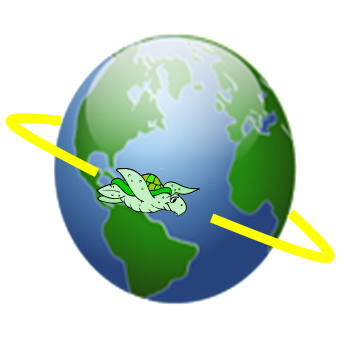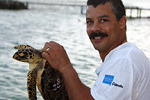

Turtle Research Fact File
Some people who love sea turtles and wish to protect them from injury and disturbance may be hesitant to allow research to be conducted on turtles that may appear to effect the turtles physically or behaviorally. While such concerns are well-intentioned, these concerns can be misinformed and serve to impede the progress of research and conservation of sea turtles.
Without conducting standard types of research on sea turtles, we cannot answer important questions about their origins, their history, their population numbers, their relations to other populations, their health, their migration routes, threats to their existence, and their behavioral responses to changes in the environment. This kind of information is vitally important for managing sea turtle populations and protected areas, and for developing policies for the protection of sea turtles species around the world.
We've developed this Turtle Research Fact File to provide a resource center for people interested in learning more about sea turtle research, why it is important, and how different research methods impact sea turtle health and behavior.
Diet Studies
|
|
| Comparing diets of marine turtles. | Link to Study |
| Determining the diet and distribution of turtles in different habitat types | Link to Study |
| Genetic Studies | |
| Linking marine turtles in the Dominican Republic to other rookeries around the Caribbean | Link to Study |
| Growth Studies | |
| The effect of tissue sampling on sea turtle growth rates | Link to Study |
| Habitat Studies | |
| Using satellite tracking to determine habitat useage of marine turtles | Link to Study |
| Capture and recaptures of juvenile hawksbills in an ecological study | Link to Study |
| Monitoring Sudies | |
| Monitoring and Research at Buck Island Reef NM, St Croix, US Virgin Islands | Link to Study |
| Nesting Studies | |
| Sand temperatures for nesting turtles in the Caribbean | Link to Study |
| Nest temperature and sex ratio implications in the Caribbean region | Link to Study |
| In-Water Studies | |
| In-water studies of sea turtles in Florida, USA | Link to Study |
| In-water survey and rehabilitation internship in Costa Rica | Link to study |
| In-water survey and tissue sample collection in South Carolina, USA | Link to Study |
| In-Water sea turtle population study and satellite tagging in North Carolina, USA | Link to Study |
| In-water sea turtle population study in Bermuda | Link to Study |
| In-water sea turtle population census in Belize | Link to Study |
| In-water surveys, flipper taggings and tissue sample at Gallow's Point, Belize | Link to Study |
| In-water study of Juvenile Hawksbills in Roatan, Honduras | Link to article |
| Flipper Tagging | |
| Flipper tagging for population estimates in Palm Beach, Florida, USA | Link to Study |
| Tracking Studies | |
| Long-term tracking studies, Palm Beach, Florida, USA | Link to Study |
| Long-term tracking studies of Hawksbill Turtle, West Palm Beach, Florida, USA | Link to Study |
| Benchmarking Research Studies | |
| Methods used by sea turtle researchers | Link to Study |
| Links to in-water sea turtle research methods | Link to Study |
| Research Support Letters | |
| The Florida Hawksbill Project | Link to Letter |
| E-Force Scuba Project | Link to Letter |
| Newsletter | |
| Sea Turtle Habitat Conservation and Population Studies | Link to e-Newsletter |
| International Student Volunteers | |
| International student volunteer in sea turtle research | Link to blog |
| Sea Turtle Recognition | |
| Computerized recognition of Hawksbills | Link to article |

| TAPS |
| Data Collectors |
| Bottles 2 Buildings |
Publications and Conferences |
| ResearchGate |
| ProTECTOR Inc. News |
| ProTECTOR Inc. Youtube |
| Interns and Volunteers |
| ProTECTOR Store |